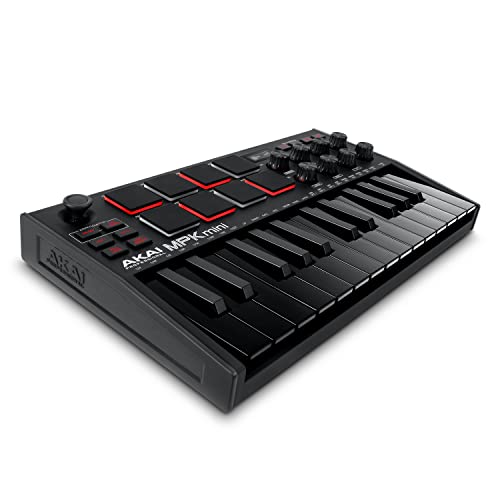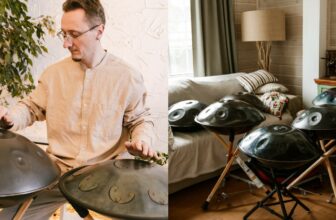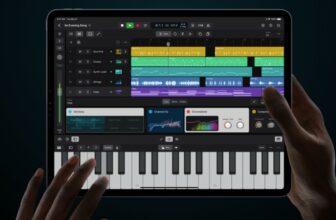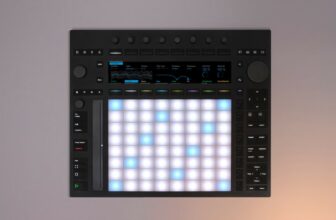The 10 Best Keyboards for Making Beats (2024)
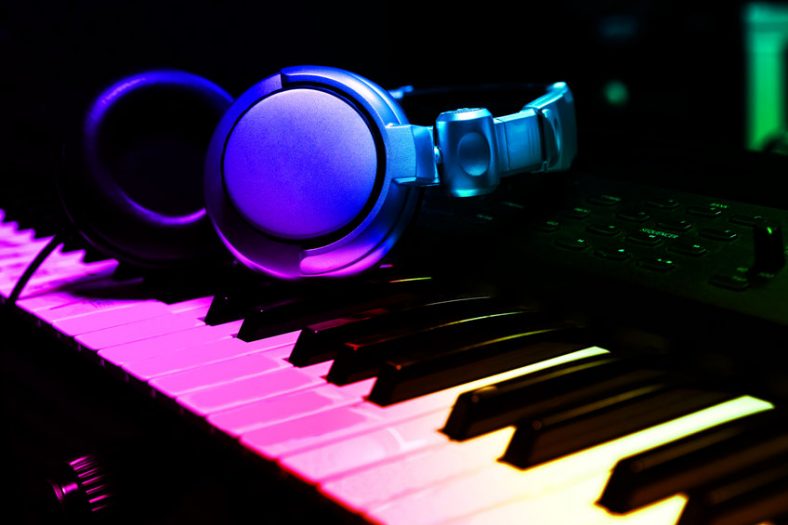
A great keyboard for making beats can do wonders for your music production workflow. It can make all the difference in the sound and feel of your beats, allowing you to unleash your creativity and bring your musical ideas to life. But with so many options on the market, finding the perfect one for your needs can be overwhelming.
Whether you’re a beginner looking for a budget-friendly option or a professional seeking high-end feature, a hip-hop producer or electronic musician, or simply looking to add some beats to your tracks, there’s a keyboard on this list that will suit your needs. I’ve considered factors such as build quality, connectivity options, and overall user experience to ensure you get the best bang for your buck.
My top pick MIDI keyboard controller is the Novation 61SL MkIII, as it is a versatile controller with MIDI and CV capabilities, an 8-track polyphonic sequencer, and comprehensive connectivity options.
As for the budget pick, I recommend the MPK Mini MK3, a great USB MIDI keyboard controller with a highly portable and simplistic design with essential features like beat pads, arpeggiator, and assignable controls.
Contents
- The Best Keyboards for Making Beats (2024) – At a Glance
- 1. Novation 61SL MkIII
- 2. MPK Mini MK3
- 3. Arturia KeyLab 88 MkII
- 4. M-Audio Oxygen Pro Mini 32
- 5. Akai Professional MPK249
- 6. Arturia MiniLab MkII
- 7. Korg Kross 2-61
- 8. Novation Launchkey Mini MK3
- 9. Alesis VI61
- 10. Native Instruments Komplete Kontrol S49
- Buyers Guide
- FAQs
- Conclusion
The Best Keyboards for Making Beats (2024) – At a Glance
Now let’s move on to the full list:
1. Novation 61SL MkIII
Novation 61SL MkIII is a versatile, durable, and feature-packed 61-key keyboard with comprehensive studio integration that really shines with its flexibility and adaptability. The MIDI keyboard pairs great with computers and sound systems, creating fantastic sounds.
It features 61 semi-weighted, full-sized keyboard keys that let you play around with many different sounds, even while building sequences and rhythm patterns on the reliable eight-track sequencer. The ease with which you can change, tweak, and create without interruption really stood out in the research I did.
Connecting your hardware with your recording software is a breeze with this keyboard. It features USB, MIDI in/out, and three pedal inputs, offering lots of connectivity options. With eight zones and a Scale mode, the product also features five color LCD screens for straightforward controls.
It can be a bit hard keyboard to get used to as it has a steep learning curve due to the high amount of features. That is why it may not be the best first-time keyboard controller for beginner musicians.
With an on-key RGB LED, you get real-time notifications that are easily noticeable, adding a fun pop of color to your creative process. What I noticed is that this keyboard works great not just with Ableton Live but with many other popular recording software, making it a versatile music partner.
Pros
- Great for music composition
- Great integration with most software
- Excellent sound quality
- Versatile, with an internal 8-track pattern-based sequencer
- Durable design
- Extensive features, including a sequencer and arpeggiator
- Full USB connectivity
- Control for MIDI hardware and CV/Gate synths
Cons
- Problems with missed notes when played quickly
- Occasional MIDI functionality issues
- Steep learning curve
Specs
- Number of Keys: 61
- Type of Keys: Semi-weighted
- Pads: 16 RGB Backlit Pads
- Other Controllers: Pitchbend, Mod Wheel
- Encoders/Pots: 8 Continuous Rotary Knobs
- Faders: 8
- Sequencer: 64 Sessions, 8 Tracks per Session
- MIDI I/O: In, Out, Out2/Thru, USB
- Pedal Inputs: 1/4″ expression, 1/4″ sustain, 1/4″ footswitch
- USB: Type B
- Software: Ableton Live Lite, 4GB Loopmaster Sounds and Samples
2. MPK Mini MK3
MPK Mini MK3 is a lightweight and portable MIDI keyboard controller with all the essential features of a beat-maker. It’s well-crafted and perfect for music gigs, recording studios, or casual jam sessions with its small size and great design, packing in power and performance.
It’s a compact device filled with features that will help unlock your creative potential. It has 25-velocity-sensitive keys for a wide musical range, but the keys are a bit stiff and hard to play.
The device includes a 4-way thumbstick for dynamic pitch and modulation control, letting you experiment with your sound. The setup can be a bit tricky on the first try, but you can get used to it in a short time.
You can enhance your rhythm creations with its eight backlit MIDI beat pads – very beginner-friendly. They’re quite sensitive and simplify programming and triggering samples, making it easy to create a drum sequence or experiment with new beats.
If you’re into music production, it has 8 knobs that you can turn to control your studio plugins, making it easier to mix your sound. These features make it portable and easy to use. That’s why it’s a great choice for both beginners and experienced MIDI programmers.
Pros
- Great for first-time MIDI keyboard users
- Compatible with most mainstream DAWs
- Compact and portable
- Durable build and responsive keys
- Intuitive and user-friendly design
- Versatile with all essential features
Cons
- Stiff keys are not the best
- Multiple features making the learning curve steep
- Small keys
Specs
- Number of Keys: 25
- Type of Keys: Synth mini keys
- Pads: 8 Backlit, Velocity-sensitive Performance Pads
- Other Controllers: 4-way Pitchbend/Modulation Joystick
- Encoders/Pots: 8 Assignable Knobs
- MIDI I/O: USB
- Pedal Inputs: 1/4″ TS sustain
- USB: Type B
- Software: MPC Beats Software
3. Arturia KeyLab 88 MkII
Packing a punch with its 88-key hammer-action keyboard, KeyLab 88 MkII gets thumbs up for working well with many digital audio workstations. Its wide pitch range gives plenty of room for musical creativity, covering all keys. Whether you’re banging out a heavy bass line or composing a gentle tune, it’s got you covered.
Fitted with 16 brightly colored, RGB-lit pads, this device stirs up creativity. These pads are great for launching clips and building beats, and I enjoy how they bring fun into serious music production. They could become your best secret tool.
With its high versatility and multiple DAW compatibility, along with its realistic sound and excellent-feeling keys, as well as 16 RGB-backlit performance pads, Arturia KeyLab 88 MkII is a great keyboard that can serve any musician and music producer easily.
The key action is not as smooth as a piano, but for most musicians, the playability would be more than enoughç. You can customize the controller’s response using the adjustable aftertouch feature. I like how it brings out performance variations and makes every piece of music feel unique.
Pros
- Excellent versatility with multiple DAW compatibility.
- Detailed, realistic sound
- High-quality, sturdy build
- Beautiful design with retro-style wooden legs
- Keys have an excellent feel and response
- Great integration of controls with software
- Comes with a powerful software instrument collection.
- Includes 16 RGB-backlit performance pads.
Cons
- Occasional delays with MIDI inputs.
- Key action is not as good as a piano
Specs
- Number of Keys: 88
- Type of Keys: Weighted, Fatar TP/100LR Keybed
- Pads: 16 RGB Backlit Performance Pads
- Other Controllers: Pitchbend and Mod Wheel
- Encoders/Pots: 9 Rotary Encoders
- Faders: 9 Faders
- Pedal Inputs: 1/4″ sustain, 1/4″ expression, 3 x 1/4″ aux pedals
- MIDI I/O: In/Out/Thru/USB
- Other In-Out: CV; Pitch out, Gate out, Mod 1, Mod 2, CV in
- USB: Type B
- Software: Analog Lab, Ableton Live Lite, Piano V, Wurli V, Vox Continental V
4. M-Audio Oxygen Pro Mini 32
M-Audio Oxygen Pro Mini 32 is a well-built and feature-packed MIDI keyboard ideal for both novice and experienced music enthusiasts. This semi-weighted, 32-key keyboard is touch-sensitive, offering music lovers plenty of opportunities for sound variation. Its small and lightweight design is an advantage for those who need to make music on the go, providing the ability to spontaneously create music whenever inspiration hits.
One thing I’ve really noticed is its Smart Chord and Smart Scale tech. These features change the way chords and scales are constructed and, together with the eight-lit-up drum pads, make the keyboard great for rhythm fans. The speed-sensitive pads have a Note Repeat function that enhances your rhythms, giving you the chance to create truly impactful beats.
I’m particularly impressed with the M-Audio Oxygen Pro Mini’s advanced capabilities. Its integrated arpeggiator with various settings lets you modify your music in ways you might not have thought possible. The new model’s OLED screen is a great addition that makes managing controls across different digital audio workstations easier.
On the cons side, there seem to be issues with key sensitivity, and it can be difficult to set up with certain DAWs. Despite these shortcomings, the keyboard’s usability features and high portability make it a great purchase for on-the-go musicians.
Pros
- Affordable and versatile MIDI controller
- User-friendly for both beginners and pros
- Lightweight and portable
- Comes with Ableton Live Lite and other software packages
- Feature-packed
- 32 semi-weighted velocity-sensitive keys
- Included auto-mapping
- Smart Chord & Smart Scale modes
Cons
- Potential difficulties in mapping the controller to the DAW
- Not the best key-sensitivity and durability
- Not compatible with iOS devices
- Keys may be too small for some users
Specs
- Number of Keys: 32
- Type of Keys: Semi-weighted, Mini-keys
- Pads: 8 RGB Backlit Velocity-Sensitive Pads
- Other Controllers: Pitch, Modulation Wheels
- Encoders/Pots: 4
- Faders: 4
- Pedal Inputs: 1/4″ sustain
- MIDI I/O: In-Out
- USB: Type B
- Software: Akai MPC Beats, Ableton Live Lite, AIR Music Tech virtual instruments
5. Akai Professional MPK249
akai professional MPK249 delivers a great feel that’s hard to beat, thanks to its semi-weighted keys that respond to every nuance of your playing. Whether you’re hammering out a strong bassline or playing a tender melody, their piano-like feel helps you truly connect with your music.
It allows you to take your tunes to new heights with this device’s advanced features for making beats with its 16 velocity-sensitive pads. They’re easy to use and beautifully backlit with bright, changing colors. You can use them to start loops, cue up samples, play short sounds, and more. Their compatibility with many different digital audio software makes for a smooth, efficient workflow and a more enjoyable music-making experience.
With this device, I like that there’s no need to wade through countless settings. It comes with 24 Q-link controllers, which let you quickly assign control knobs, sliders, and switches. This makes it easier to map out your tracks and ensure your ideas become actual songs sooner than you could ever imagine.
But it’s sad that this product seems to have serious compatibility problems, particularly with Mac systems like Big Sur and M1. It’s also disappointing to hear about issues with the keyboard’s durability. Reports suggest that the keys may start to fail or become unreliable after a reasonable amount of use, which taints the appeal of its impressive features.
While it is one of the most popular keyboard controllers out there, it also has negative sides, especially its durability and compatibility. Some users experienced compatibility problems with Mac, and the key durability of the device is not the best.
Besides these minor issues, it is a great keyboard that can be your all-in-one solution for music production.
Pros
- Good for space optimization fits comfortably on a desktop
- Great compatibility with major DAWs
- Semi-weighted keys
- Versatile with 49 keys and 16 MPC drum pads
- Good construction
- Great software package
- Key Aftertouch
Cons
- Not the best feeling keys if you are used to full-size keyboards
- Not compatible with some Mac OS versions like Mac Big Sur
- Key quality deteriorates after extensive use
Specs
- Number of Keys: 49
- Type of Keys: Semi-weighted
- Pads: 16 Backlit Velocity-sensitive pads
- Other Controllers: Pitchbend, Mod Wheel, Assignable Buttons
- Encoders/Pots: 8
- Faders: 8
- Pedal Inputs: 1/4″ sustain, 1/4″ expression
- MIDI I/O: In/Out/USB/iOS
- Other In-Out: CV; Pitch out, Gate out, Mod 1, Mod 2, CV in
- USB: Type B
- Software: VIP3.0, Ableton Live Lite, Hybrid 3 by AIR, SONiVOX Twist 2.0, MPC Beats
6. Arturia MiniLab MkII
Arturia MiniLab MkII is a conductor of creativity that changes to fit different music-making methods. It has many features for both new and experienced musicians, helping you create unique soundscapes to your liking with its simplistic yet versatile design.
It features a solid build and high-quality keys, giving the user a sense of reliability and a professional look that makes the experience feel premium. The MiniLab MkII comes with 16 rotary encoders, 8 sensitivity-adjustable pads, and touch sensors for pitch-bend and modulation, helping you create your music in a beautiful way, bringing out your inner music master.
It is a small and light controller, perfect for musicians who are always in one place or on the go. But, as it is a compact device, keys, and knobs might be too small for some musicians, and the pads are not as sensitive as I would have liked. Yet, the MiniLab MkII still remains a robust tool for making music, especially for beginners, due to its ease of use, paving the way for any kind of music expression.
Pros
- Great quality and feel of the keys
- Versatile and suitable for beginners to professionals
- High compatibility with most music software
- Portable and robust for on-the-go musicians
- Impressive software bundle included
- Features pitch bend and modulation capacitive touch sensors
- Long-lasting due to durable build and materials
Cons
- Software setup is complex
- Drum pads could be more sensitive
- Small keys and controllers
Specs
- Number of Keys: 25
- Type of Keys: Mini
- Pads: 8 Backlit velocity and pressure-sensitive pads
- Other Controllers: 2 capacitive touch sensors for pitch bend and modulation
- Encoders/Pots: 16
- Pedal Inputs: 1/4″ control
- MIDI I/O: Out/USB
- USB: Type C
- Software: Analog Lab Lite, Ableton Live Lite, UVI Grand Piano
7. Korg Kross 2-61
If you want a versatile keyboard to create any kind of music, Korg Kross 2-61 is the ideal choice. Looking closely at the 61-key synth workstation, it’s clear why it’s a great combo of imagination and flexibility. I really like its feature of realistic sound projection, which stands out among other digital keyboards and enhances recordings significantly.
This versatile audio workstation offers infinite music possibilities with its lightweight yet powerful design. Its flexibility is evident in features like step and MIDI sequencers, perfect for crafting unique sounds and musical arrangements. I especially like the Mic/Line inputs option, which accommodates various types of inputs and outputs.
A significant feature that impressed me is the EDS-i Sound Engine built into it. This excellent addition allows for more sound explorations. But, the programming interface was a key downside. Several users find it tricky and hard for beginners to set up and use.
The synth workstation has a sleek, black design, proving that its appearance matches its performance. Even in the constantly changing digital music gear scene, it has maintained a strong marketplace presence for many years. This model is sure to change your studio’s atmosphere while offering excellent sound smoothness.
Pros
- Wide range of features
- High-quality and varied sound library
- Sounds are extremely realistic
- Good value compared to other keyboards
- Versatile, suited for studio and live performance
- Compact package
- Comes with Synth-action Keybed, Step, and MIDI Sequencers
Cons
- Interface for programming can be awkward
- High range of features makes it less friendly for live performances
- Navigation through operations may be complex
- Limited step sequencer functionality
- Drum track patterns may be simplistic
Specs
- Number of Keys: 61
- Type of Keys: Synth-Action Velocity Sensitive
- Pads: 16
- Polyphony: 120 Notes (mono), 60 Notes (stereo)
- Number of Effects: 134 Types, 2 Master Effects, 5 Insert Effects
- Other Controllers: Pitchbend, Mod wheel
- Pedal Inputs: 1/4″ damper, 1/4″ assignable switch, 1/4″ assignable pedal
- MIDI I/O: In/Out
- USB: Type B
- Software: Kross 2 Editor and Plug-In Editor
8. Novation Launchkey Mini MK3
Novation Launchkey Mini MK3 is a great keyboard controller for active musicians who are always on the go. Its small and light design slips easily into a backpack, letting you show off your skills anywhere, anytime, be it at a friend’s get-together or a beach jam at sunset.
This small but strong device features a 25-key MIDI keyboard that is both nice to look at and fun to play. The bounce-back of the keys offers a pleasing touch every time you play them, giving musicians a great feeling.
However, some people may find the key size too small and challenging to use. Each key holds its unique tune, waiting for your artistic touch to bring it to life.
I’m impressed by the Launchkey Mini MK3’s seamless compatibility with Ableton Live. Users can easily control macros or activate clips and scenes for a smooth and continuous creative process. If you use different software, this device still syncs up without any issues. Its ability to connect with various DAWs is particularly noteworthy, making it excellent for music production and programming.
Pros
- Compact and portable design
- Great integration with Ableton Live and most DAW software
- Arpeggiator and fixed chord mode
- Touch-sensitive pads and sliders
- Affordable and beginner-friendly
Cons
- Small keys may not be for everyone
- Requires purchase of Ableton Live for full utilization
- Not suitable for advanced musicians due to key limitations
Specs
- Number of Keys: 25
- Type of Keys: Mini-keys, Synth-action
- Pads: 16 RGB velocity-sensitive pads
- Other Controllers: Pitchbend Touch Strip, Modulation Touch Strip
- Encoders/Pots: 8
- Sequencer: 64 Sessions, 8 Tracks per Session
- Pedal Inputs: 1/4″ sustain
- MIDI I/O: 1/8″ TRS Type A (Out), USB
- USB: Type B
- Extra Features: Transpose, Fixed Chord Mode, Arpeggiator
- Software: Transpose, Fixed Chord Mode, Arpeggiator
9. Alesis VI61
The Alesis VI61 is a fantastic 61-key keyboard, great for both seasoned players and beginners. What stands out the most about it is its top-notch build quality. It’s praised for being reliable, responsive, and versatile. It makes playing different chords, bass notes, and melodies easy – like playing an acoustic instrument.
What I like is the authenticity it brings to playing – it’s sort of a mix between playing a non-weighted keyboard and a full-weighted one. It comes with 16 trigger pads that respond to pressure for spontaneous beat-making and clip-triggering, boosting the fun of jam sessions.
Also, the pads have colorful RGB lights that flash to provide visual cues, allowing for more rhythmic creativity. Plus, it has 48 buttons and 16 knobs that you can map out yourself, making it convenient for mixing tracks.
However, there are a few snags in this keyboard too. The keys do not always register the light touches, and the device has a steep learning curve, making it a bit complicated to use on the first attempts.
Supporting USB MIDI and 5-pin MIDI out connections, the Alesis VI61 is versatile in that it works well with both Mac and PC. It is a feature-packed and versatile keyboard for making beats, adding melodies, playing chord progressions, or whatever you like.
Pros
- Excellent build quality
- 61 full-sized semi-weighted keys
- 16 trigger pads, 48 assignable buttons, and 16 assignable knobs
- Seamless integration with music software
- Great for beginners as well as professionals
- No latency
- Great Production software included
Cons
- Keys don’t always register light touches
- The layout may be complicated for some users
Specs
- Number of Keys: 61
- Type of Keys: Full-size, Semi-weighted
- Pads: 16 RGB Backlit Pads
- Other Controllers: Pitchbend, Mod wheel
- Encoders/Pots: 16 Knobs
- Pedal Inputs: 1/4″ sustain
- MIDI I/O: Out
- USB: Type B
- Software: Ableton Live Lite, Xpand!2, MPC Beats
10. Native Instruments Komplete Kontrol S49
Native Instruments Komplete Kontrol S49 is a great MIDI 49-key MIDI keyboard. It surprises the users with how well the keys work and how flexible it is. What truly sets it apart, though, are its top-notch synthesizing keys and unique creativity-boosting features, including chord scaling options. It’s praised within music circles for how well it works with different software.
It comes with a professional-grade keyboard, as the Fatar keys with aftertouch stand out for their power and sensitivity. It’s what serious musicians need to enhance their craft. Plus, the 49 semi-weighted keys offer an avenue to explore various genres of music.
Simple designs can sometimes reveal sheer brilliance. This fact rings true for this keyboard’s layout, which has amazed me with its easy-to-use functionalities, such as pitch and modulation wheels and a touch strip for more room to create.
The only down part for beatmakers is that the device lacks pads. This one is more suited for music producers who work more with keys than anything. Also, it is a slightly more pricey option than similar keyboards, but for the key feel, it is worth the price.
The keyboard’s comfort level is a priority. Additionally, the dual high-resolution color displays provide instant feedback on sounds and projects. So, get ready to unleash your musical genius!
Pros
- Great synth-style keys
- Useful tools for scale and chord-challenged musicians
- Comes with excellent soft synths
- Keys mode and chord options
- Pro-grade Fatar keybed with aftertouch
- Pre-mapped control of KOMPLETE instruments
- Full VSTi support
- High-res color screens for easy understanding
Cons
- No pads
- A bit pricey
Specs
- Number of Keys: 49
- Type of Keys: Semi-weighted Fatar Keybed
- Other Controllers: Pitch Wheel, Mod Wheel, Touch strip
- Encoders/Pots: 8 touch-sensitive knobs, 4-directional push encoder
- Pedal Inputs: 2 x 1/4″ sustain – expression
- MIDI I/O: In/Out/USB
- USB: Type B
- Software: Komplete Select, Komplete Kontrol (as downloads)
Buyers Guide
Understanding Different Types of Keyboards for Beat Making
When setting out to purchase a keyboard for making beats, it’s essential to understand the various types available. The five main categories are Workstation keyboards, Digital Pianos, MIDI controllers, Synthesizers, and Arranger Keyboards.
Workstation keyboards are versatile powerhouses that enable the composition, arrangement, and production of music without relying on external devices or software. These keyboards come with a wide array of instrument tones and rhythmic structures.
Digital pianos, as the name suggests, are designed to imitate the sound and feel of traditional pianos but in a more compact and portable format. They are an excellent choice for beatmakers who want authentic piano sounds in their productions.
MIDI controllers do not produce sound themselves but are used to control other musical devices and software. These are invaluable for beat-making because they can easily manipulate various aspects of the composition.
Synthesizers generate electrical signals converted into sound. They are great for beat makers looking to create unique sounds, offering extensive manipulation options for waveforms and filters.
Finally, Arranger keyboards combine keyboard playing with automatic accompaniment – they instantly produce full arrangements based on the chords you play.
Key Factors to Consider When Buying a Beat-Making Keyboard
When selecting a keyboard for beat making, you need to consider several factors such as pad sensitivity, the number of keys, quality of keys, sound quality, integrations with Digital Audio Workstations (DAW), and whether you need a standalone keyboard or a MIDI controller.
Pad sensitivity refers to how responsive the pads of the keyboard are to varied pressure. A highly sensitive pad will accurately reflect the intensity of your keystroke, leading to more expressive performance.
Keyboards vary significantly in the number of keys, with models ranging from 25 to a full 88-key range. The right choice depends on your personal needs and the type of music you are making.
The quality of keys is also of the utmost importance. Weighted or semi-weighted keys offer a more piano-like feel and provide a more dynamic response.
When it comes to sound quality, workstation keyboards, and synthesizers naturally shine. However, for MIDI controllers, sound quality comes more from the software or hardware it’s controlling.
If you’re using a DAW for your music production, compatibility, and easy integration are essential. You should check out if the keyboard integrates well with your choice of DAW.
Lastly, decide whether you need a standalone keyboard, which can create sounds on its own, or a MIDI controller that controls software or external sound modules.
Choosing the Right Number of Keys Based on Skill Level
The number of keys on your chosen keyboard can largely depend on your skill level—beginner, intermediate, or advanced.
For beginners, a keyboard with 25 to 49 keys is probably sufficient while they learn the basics.
Intermediate players might prefer a 49- or 61-key keyboard, especially the ones that provide a wider range but are still relatively compact.
If you’re a seasoned professional, an 88-key keyboard can give you the entire range of a standard piano while providing functionality for producing beats.
The Relevance of the Software in Beat-Making Keyboards
Many keyboards come with bundled software, which can greatly impact beat-making capabilities. Some common additions include Ableton Live Lite, popular for live performances, and native instruments like Analog Lab Lite.
When getting a MIDI keyboard, you do not have to be too concerned with the DAW software (e.g., Garageband, Ableton Live, etc.) you use on your computer because they all use the same MIDI specifications, and they are pretty interchangeable.
That said, some MIDI controllers are made specifically to support the design and features of a particular DAW. For example, MIDI controllers made specifically for Ableton Live will be based around the session view of this software and be optimized for use in that particular software. Therefore, if you use a particular DAW, keep a lookout to see if you can get a controller most compatible with your DAW’s workflow.
FAQs
What features should I look for in a keyboard for making beats?
When purchasing a keyboard for making beats, consider features such as drum pads for triggering samples, velocity-sensitive keys for expressive playing, and MIDI connectivity for seamless integration with software.
Is it better to choose a keyboard with weighted or unweighted keys for making beats?
While personal preference plays a role, unweighted keys are generally more suitable for beat-making as they offer a more responsive and faster playing experience, allowing for quick and precise triggering of drum sounds and samples.
Can I use a keyboard for making beats without a computer?
Yes, many keyboards for making beats come with built-in sound libraries and pattern sequencers, allowing you to create beats independently without needing a computer.
How many octaves do I need on a keyboard to make beats?
The number of octaves depends on your personal preference and the complexity of your beats. A keyboard with at least 49 keys (four octaves) is commonly recommended for beat-making, but you may choose to have more or less based on your specific requirements.
Conclusion
The world of keyboards and options for music production and beat-making is growing each day, with new devices on the market offering different features and workflows. There are many great products coming to the scene every year, giving musicians more options to express themselves.
After going through some of the best keyboards for making beats today, my top pick is the Novation 61SL MkIII, as it can be used as a maestro conducting an orchestra, allowing you to control your entire studio and create music that will make heads nod, and jaws drop.
For musicians who want something more budget-friendly, I recommend MPK Mini MK3 because its compact yet powerful design equips you with all the essential features for making beats and producing music while being affordable and highly portable.
And there you have it, folks! The 10 best keyboards for making beats. Whether you are a seasoned producer or starting, these keyboards will ignite your creativity and help you create mind-blowing beats. So, get your hands on one of these keyboards and let the music flow!


